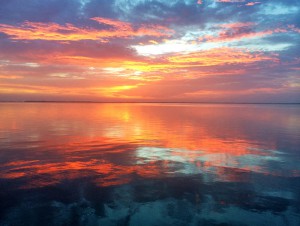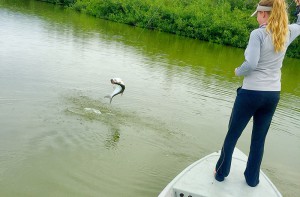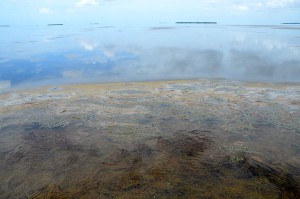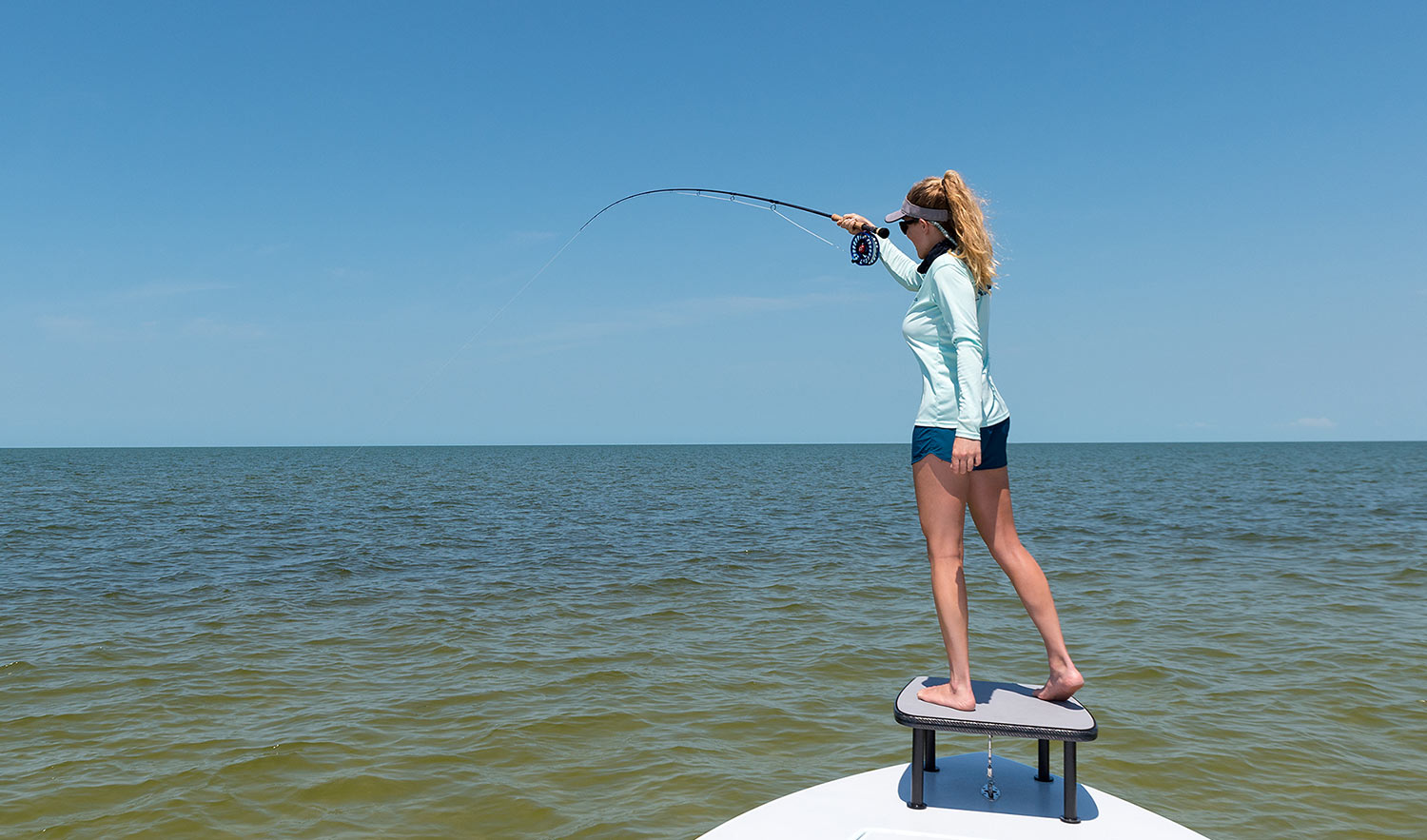By Alex Woodsum
Florida Bay is a fishery in the balance.
In the four years since I moved to Miami it has become a frequent ritual on my precious days off (particularly in the summer) to pay a visit to Flamingo, the outpost of Everglades National Park at the southernmost tip of Florida’s mainland. A successful trip requires rising hours before dawn—filled with momentary regret when the alarm goes off—and driving close to an hour and a half to reach the boat ramp. The latter part of the journey winds through Florida City, past agricultural lands bursting with vegetables and fruit trees and little else aside from a state prison, and through the gates of Everglades National Park. Nearly an hour on a long, dark road surrounded by barely tamed vegetation and you finally reach the ramp.
 There is a distinct advantage—beyond getting your desired fishing spot—to getting there before dawn, fighting through the swarm of summer mosquitoes and thick blanket of humid air to be one of the first boats out of the small marina. For a brief moment, you get to experience a magical, otherworldly place in its undisturbed state. The sunrise, unencumbered by buildings, takes over the whole sky. Thousands of birds are engaged in their morning rituals. Heron methodically wade the shallow flats in search of prey, their elegant bodies and sharp beaks outlined by the glowing sun. Pelicans gently bob in the current. Osprey perch on channel markers, clutching lifeless mullet in their sharp talons. When boats approach, the birds glare angrily over the disruption. Their bodies tense before they lazily launch into the air, headed elsewhere in pursuit of peace and quiet.
There is a distinct advantage—beyond getting your desired fishing spot—to getting there before dawn, fighting through the swarm of summer mosquitoes and thick blanket of humid air to be one of the first boats out of the small marina. For a brief moment, you get to experience a magical, otherworldly place in its undisturbed state. The sunrise, unencumbered by buildings, takes over the whole sky. Thousands of birds are engaged in their morning rituals. Heron methodically wade the shallow flats in search of prey, their elegant bodies and sharp beaks outlined by the glowing sun. Pelicans gently bob in the current. Osprey perch on channel markers, clutching lifeless mullet in their sharp talons. When boats approach, the birds glare angrily over the disruption. Their bodies tense before they lazily launch into the air, headed elsewhere in pursuit of peace and quiet.
The fishing and habitat are diverse.
On a good day, the whole place feels alive, teeming with life. On the shallow grass flats, the water is undisturbed other than the nervous wake of aimlessly milling schools of mullet and the occasional redfish tail gently breaking the surface, sending delicate ripples outward. These fish aren’t a sure thing, but if you can approach and drop a fly quietly right in front of one, you will generally be rewarded. Large tarpon roll in deeper water, their broad backs reflecting the early morning sun like mirrors. Once the sun is high enough, they sometimes lay up and can be spotted by the well-trained eye. In the creeks and hidden lakes, snook and juvenile tarpon use mangroves for cover and safety until they are large enough to venture into bigger water. Present a fly in their vicinity and they will hungrily jump on it. It can be very gratifying fishing after a spring tarpon season filled with rejection and heartbreak.
 Flamingo has always been fairly consistent for me in the limited years that I’ve fished it. People who have been fishing there for many years often remark how much better it was back in the day–pristine habitat, lush seagrass and large numbers of fish. In early August of last year, I first noticed significant changes and witnessed firsthand the water issues that have been going on for years, chipping away at the quality of habitat and fishing.
Flamingo has always been fairly consistent for me in the limited years that I’ve fished it. People who have been fishing there for many years often remark how much better it was back in the day–pristine habitat, lush seagrass and large numbers of fish. In early August of last year, I first noticed significant changes and witnessed firsthand the water issues that have been going on for years, chipping away at the quality of habitat and fishing.
The salinity in Florida Bay is kept in check by rain and freshwater flowing down through the state of Florida.
Historical freshwater flows have already been severely disrupted by development, sending too much freshwater east and west from Lake Okeechobee and not enough water south towards Florida Bay. Too little rain last summer coupled with the lack of freshwater flow south led to hypersalinity (too much saltwater) in the Bay. Seagrass died and floated in mats as far as the eye could see. Not enough oxygen in the water left many baitfish and shrimp dead, and larger fish departed in search of cleaner water and food. Giant swaths of the flats stood barren, stripped of vital grass that takes years to regrow.
The aftermath of that die-off remains, and high temperatures and salinity this summer have led to more seagrass dying. Many of the areas where one could reliably find fish as recently as last July are utterly devoid of life. More boats crowd onto the fewer flats that still contain grass and fish.
My experience last weekend in one such place was the worst I’ve had so far.
 Poling an expansive flat for over two hours, we saw nothing but a few catfish. The schools of redfish that would normally be on the flats (and were there mere weeks ago) were nowhere to be seen. More unsettling were the thick mats of floating grass, the only disruptions on the smooth, glassy surface. Peering down, I could see all the dead grass that had already settled on the bottom, slowly smothering much of the living grass beneath it.
Poling an expansive flat for over two hours, we saw nothing but a few catfish. The schools of redfish that would normally be on the flats (and were there mere weeks ago) were nowhere to be seen. More unsettling were the thick mats of floating grass, the only disruptions on the smooth, glassy surface. Peering down, I could see all the dead grass that had already settled on the bottom, slowly smothering much of the living grass beneath it.
The problem in Florida Bay isn’t as visible—no news cameras capture footage of crusty blue green algae, dead fish, dead manatees—but it is just as indicative of the water crisis that Florida is currently facing. It’s certainly depressing, but I’m not trying to be morose. The fishing in Florida Bay is still good. Many of the large bonefish caught today come from there. The tarpon fishing in the Bay and down through the Keys is hard to beat. If you want to catch a big permit, Florida is a great bet. And the Everglades are one of the most unique ecosystems in the world, a place that is very special to anyone who has had the opportunity to experience it. That’s why we need to talk about it. We need to notice when our natural places are suffering, and we need to take steps—as people, as states, as countries—to fix them, before it’s too late.
Alex Woodsum is the Marketing and Communications Director for Bonefish & Tarpon Trust. To learn more about the challenges with Florida’s water and what you can do to help, visit www.btt.org/fixourwater.
Alex Woodsum Gink & Gasoline www.ginkandgasoline.com hookups@ginkandgasoline.com Sign Up For Our Weekly Newsletter!


I had a similar discussion with Aaron Adams about water quality issues in Florida many years ago when he was with Mote Marine. Both of us came from the Baltimore area and fished the Chesapeake which became one of the most if not the most polluted estuaries in the country. We saw how a 500-1000 year storm named Agnes destroyed the bay grass, ag runoff, sewage pollution, loss of oysters and clams all combined to create miles of dead zones in the Chesapeake. The same thing can happen here in Florida if we don’t become proactive to protect the waters. Md. has large proactive environmental groups like Chesapeake Foundation, which uses education, advocacy, litigation, and restoration. I’ve seen them in court taking on the government and winning. My hope is that all the groups in Fl. come together and do the same before it’s too late. As a past enforcer of water pollution regs, one constant always seemed to hold, once a water body is polluted, and eutrified, the amount of money needed for the cleanup always seemed more then what the taxpayers wanted to spend. I hope that is not the case in Fl. Thanks for all you’re doing, education has always been a key for success.
Thanks for the reminder for all of us to help keep the pressure on the officials to remedy this worsening situation in Florida. It’s not just a Forida problem and we all need to do our part to spread the word.
Thanks to G&G for keeping the issue out front for the rest of the country to see!
Similar issues are occurring up in our area, multiple fish kills due to run off from farmland.
There are many of us who are aware of the dire consequences that are becoming more and more difficult to ignore regarding our water resources in Florida. We need to promote a grass roots water ethic by educating the people who are simply unaware or don’t care. The truth is we will all care if property values plummet and water becomes a precious commodity only a few can afford. It is so much less expensive to prevent than to repair. Blue Spring Alliance together with the City of DeLand, Stetson’s Institute for Environment Water Resilience and many partners and sponsors are hosting The Water Festival in DeLand on October 16th inviting all residents of Volusia County as a start in building a water ethic. Please go to thewaterfestival.org for more information.